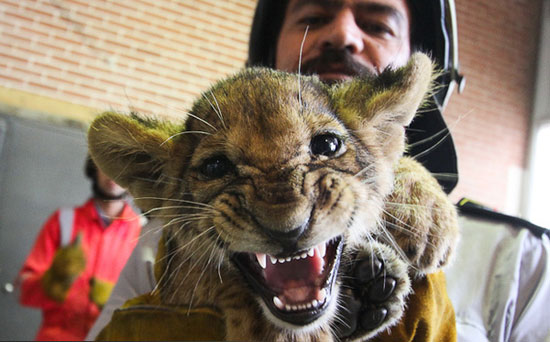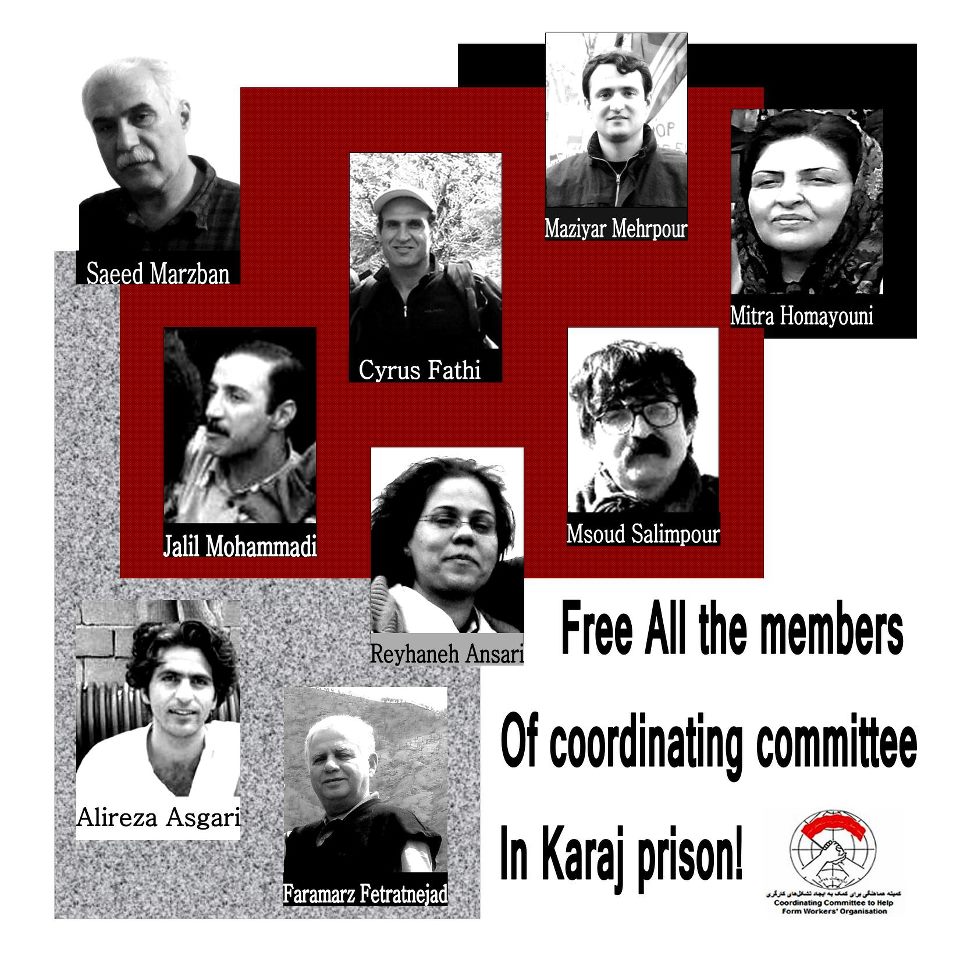Iran Feature: The Week in Civil Society --- At Neda's Grave (Arseh Sevom)

What's the story behind this lion cub? See last entry in the round-up....
The latest review of events inside Iran by Arseh Sevom, the NGO promoting civil society:
The 20th of June marked the third anniversary of the violent death of Neda Agha Soltan, caught on film.
Neda’s family was never allowed a decent memorial service because of “security concerns,” but her grave has now become a site of pilgrimage for many activists and dissidents in Iran. Last week, despite pressure, Neda’s family and some of her friends and relatives gathered at her grave in Behesht-e Zahra cemetery outside Tehran to remember a girl who, as recounted in this piece from our civil society magazine, was “unlike most of the national heroes of Iranian patriarchal society”. She was a young woman who “became the face of the nation. She was special because she was not special at all. She was the Iranian girl next door; one world apart from the image endorsed by the Islamic Republic.”

10,000 Signatures to Halt Subsidy Reform
According to ISNA, the second phase of the subsidy reform plan (targeted subsidies) will be executed this year.
The first phase of the subsidy reform plan launched during the Mahmood Ahmadinejad administration coincided with economic decline in Iran, double digit inflation, and a steep drop in the value of the Iranian rial.
Iranian workers have been hit especially hard by the subsidies reform plan. They have seen prices for basic goods sky rocket, while their salaries have remained stable. Iranian labor activists collected signatures from laborers around the country demanding the government halt the second phase of the subsidy plan.
Iranian Labor News Agency (ILNA) reports that, as of 16 June, 10,000 Iranian workers had signed petitions protesting the implementation of the second phase.
The website of this initiative has a sample page that can be printed out, signed, and sent to the organizing committee at the postal address provided.
The organizers identify themselves as the Iranian Independent Workers’ Union. They have called on their peers to join them in protesting the current situation:
“Dear Colleagues and friends! This petition is the least we can do at the national scale throughout the country to defend ours and our families’ life and welfare. Join us all over Iran, sign this petition, and share in the defense of our own lives, and the lives of our families.”
Last week we reported on the mass arrests of members of the Coordinating Committee to Help Form Workers' Organizations. They have now published an account in English of the violent break-up of their meeting.
The organisation reports over 60 were swept up in arrests, with nine still held. Security forces shot into the air and beat many members. They did not produce a warrant or other orders.

Tribunal Investigates 1980s Mass Executions in Iran
The non-binding (Iran Tribunal) held meetings last week to investigate the massacre of political prisoners in the 1980s. John Cooper, a former British MP who is now part of the steering committee for the Tribunal tweeted, “Over 80 victims gave evidence over last 5 days.”
The hearings were so heart-wrenching that at some points the judges were brought to tears.
Arseh Sevom has been covering the Iran Tribunal on its Persian and English sites. An interview with Professor Payam Akhavan who led the fact-finding committee is available online in English and Persian.
Excerpts of the testimonies were tweeted by those in attendance and a selection in English can be read on Arseh Sevom.
Narges Mohammadi: “You are Responsible for Whatever Happens to Me”
Prisoner of conscience and human rights activist, Narges Mohammadi, is facing an alarming health condition putting her in urgent need of immediate medical care.
Mohammadi sent an open letter to the Tehran Prosecutor describing her treatment as “gradual death” and announcing, “Whatever happens to me, the authorities are responsible for that.”
Mohammadi asserted that if she dies her death will not be “caused by natural causes” as in the cases of Haleh Sahabi and Hoda Saber, who both died as a result of treatment in prison by security forces:
It should be noted that I entered Evin prison on June 10, 2010 in complete health, and on July 1, 2010, I was transferred to hospital suffering from serious neurological and psychological disorders.After intensive medical care and using 18 pills a day, I was discharged from hospital. I currently am on 11 pills a day, but since my latest arrest, these medications do not control my illness and my illness has worsened.
I currently am incarcerated among fifty female murderers, death row prisoners (on narcotics charges), [those on] immorality charges, and even women with mental disorders.
Since I have entered this ward, I have experienced nothing but anxiety, nervousness and fear, which has exacerbated my illness moment by moment.
My medical records and the opinion of my treating physicians suggest that my illness has a direct relationship with the escalation of anxiety.
And even while this is so, since entering this ward, I have encountered horrible situations that I am not even able to describe and write about.
Putting me under such a stressful situation is equivalent to feeding me cups of poison that help to destroy me moment by moment.”
Nobel Peace Laureate: Islamic Republic Seeking Death of Prisoners of Conscience
The Iranian Nobel Peace Laureate, Shirin Ebadi, warned against the looming danger of a organized death plot against prisoners of conscience in Iran.
Ebadi points to various reports and quotes from Iranian officials, including a deputy prosecutor’s reported response to Mohammad Sedigh Kaboudvand’s spouse, “The death of prisoners does not matter for us at all,” the comment of another official, “The angel of death visits everywhere, including prisons,” and the threats by Narges Mohammadi’s interrogator that he will “not allow her to get out alive".
There have been a number of deaths among prisoners of conscience in recent months. Kidney problems are among the common ailments.
The Iranian police continued enforcing the so-called “social security” plan, storming another concert in Tehran.
As we recently reported, there has been an escalation in the pressure on social freedoms, especially concerning women’s dress. Raids gained momentum when an Iranian police commander of NAJA (the disciplinary forces of the Islamic Republic) slammed actresses and those in the cinema industry for their “obscene” behavior and warned that the State security force NAJA will not tolerate any more “mischief” at public events and concerts. There have been numerous cases of police storming such public events and arresting women whose choice of wardrobe does not match theirs. At one point actress Laleh Eskandari was among the detainees.
Death Penalty for Alcohol Drinkers
Radio Zamaneh reports two men who had been repeatedly arrested for alcohol consumption have been handed the death penalty.
The BBC reports on concern from Iranian health officials about the rise in alcohol use. They cite the results of sobriety tests given to drivers in Iran showed 26% were drunk.
Last week, four lion cubs and two bear cubs apparently escaped from the house of a zoo employee in Mashhad. There is speculation as to why these cubs were kept at a residence, whether they were born in the nearby zoo, and why their birth was never registered with the Iranian environment office.
Meanwhile, the playful stroll of these six in the alleys of Mashhad made many smile for a few minutes.

 Tuesday, June 26, 2012 at 10:15
Tuesday, June 26, 2012 at 10:15
Reader Comments